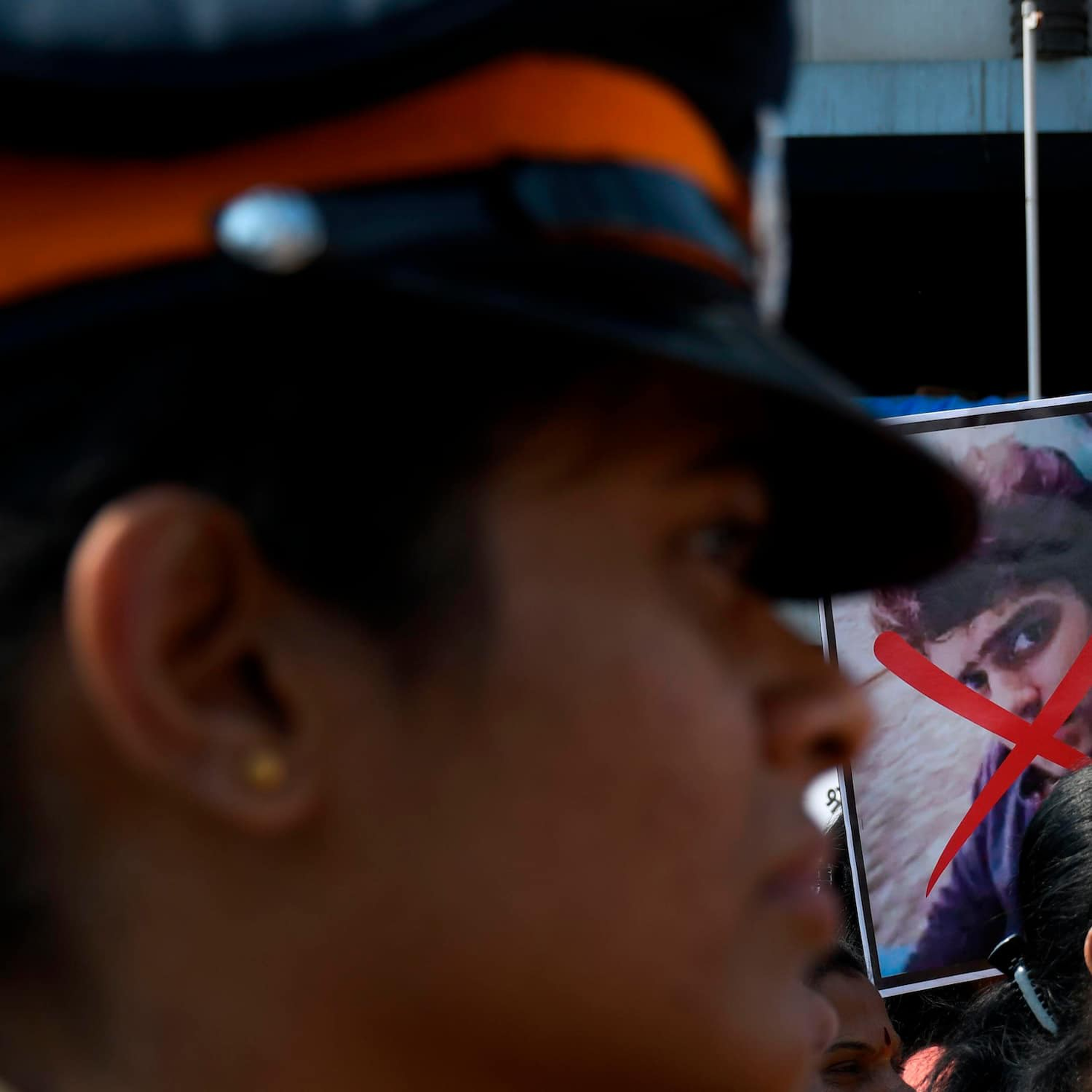NEW DELHI — On a Thursday afternoon several weeks ago, India’s most sensational murder case in years kicked off in a South Delhi court.
Aaftab Poonawala, a 28-year-old chef and food blogger, was being tried for allegedly killing his 27-year-old girlfriend, Shraddha Walkar — the IT saleswoman whom he had met on the dating app Bumble in 2019 — and sawing her body into 35 pieces. News channels reenacted the grisly details using animated graphics; newspapers furrowed into the couple’s stormy relationship. Even professional lawyers expressed outrage and gathered by the hundreds outside the judge’s chambers to demand that Poonawala be summarily hanged.
But in India, Poonawala isn’t all that is on trial.
Instead of viewing the brutal killing as a one-off, Indian society has been litigating a host of related questions. On social media, on cable news and within family WhatsApp group chats, the story of Walkar, a Hindu woman who defied her parents’ wishes and moved in with Poonawala, a Muslim man she met online, has been the vehicle for intense, often intergenerational debates over women’s independence, family, religion, domestic violence — and, above all, love in the age of apps.
In some ways, the Walkar saga has reflected a collision of two worlds. India, one of the world’s most digitally connected countries, is witnessing a dramatic growth in the use of dating apps. Most Indian users hail from smaller towns, and during its most recent financial quarter, Austin-based Bumble said its India revenue had doubled from a year earlier.
Yet India is also a country where the average woman marries at 19, and nuptials are often arranged by parents and dictated by caste and religion. Just 1 percent of women choose to not get married. Only 13 percent of marriages are between people of different castes, while 2.5 percent of couples belong to different religions.
When Walkar’s killing hit the headlines, it prompted a traditional backlash over the growth of unmarried couples living together — commonly called “live-in relationships” in India — and the lurking dangers of the apps. There was also the religious element, which added fuel to the explosive story: Walkar’s Hindu parents broke off ties with their daughter two years ago after she decided to move in with Poonawala, according to police records. The Walkars “don’t do inter-religion/inter-caste marriage,” her father told police, records show.
At a news conference organized on Dec. 9 by members of India’s ruling party, Walkar’s father, Vikas, urged the country to restrict dating apps and to better educate children so they become “religiously awakened.”
“We need to think more about these modern dating apps that our children are using to get into relationships,” he told reporters. “There is no control. We parents are helpless.”
In recent weeks, Walkar has been frequently portrayed in news reports as the defiant daughter who strayed. When the top-selling Hindi-language newspaper, Dainik Jagran, posted a video headlined “Love, live-in and murder” a few weeks ago that got a million views, one of the most-liked comments on YouTube said the episode’s takeaway was: “Don’t disrespect your parents.”
Seema Chishti, a New Delhi-based journalist who published a book in 2022 about her parents’ interfaith marriage, said the overwhelming public response to the murder case so far — and the dominant tone of the media — is that this is a teachable moment for young people in India.
The message is, “listen to mummy-papa, do not live in with anyone. If you marry on your own, certainly do not marry a Muslim,” Chishti said. “This is India unreformed — a kind of social regression in overdrive.”
Sweta, a 30-year-old researcher in Delhi who lives with a boyfriend she met on Bumble, recalled her mother calling her shortly after the killing hit the news, saying she was “shocked that girls these days, they make such decisions in their life.”
Sweta, who did not reveal her relationship to her mother, snapped back. “I told her when there is one incident of dowry violence, people don’t say all arranged marriages are bad, hence we must stop this,” she said. “Now, it’s very easy for people to generalize and say it was the girl’s fault, she should’ve been careful about online dating and live-in relationships.”
Last year, Sweta said, she signed a tentative contract with a new landlord, only to scrap it after he insisted that the young couple must be married within six months or vacate the property. She spoke on the condition that her last name not be published, to avoid further trouble with landlords and relatives.
“After this Aaftab Poonawala case, imagine if I were to move with a boyfriend now, the conversations you would have with landlords,” she said, exasperated.
The most popular and interesting stories of the day to keep you in the know. In your inbox, every day.
Since police on Nov. 15 found what they have confirmed to be Walkar’s remains buried in a forest, the controversy over traditional values and dating has grown increasingly high-pitched as gruesome details about the May killing emerged drip by drip. Among India’s ascendant Hindu right wing, so have warnings about Muslim men.
As reports surfaced about Poonawala’s allegedhistory of physically abusing Walkar, some debaters on prime-time shows asked whether it reflected a broader conspiracy by Muslims to seduce or harm Hindu women. On Nov. 29, Poonawala confessed to killing Walkar, telling forensic examiners he strangled her in the heat of an argument over finances and his infidelity, according to Indian press reports. That day, men brandishing swords were arrested for attacking a police van that escorted Poonawala to a forensics laboratory.
Meanwhile, national newspapers have reported that Poonawala used Bumble to invite another date to his house while Walkar’s remains were allegedly stashed in his freezer. On a near-daily basis, the Delhi police have been tweeting advice to young women about unverified profiles, impersonation and other dangers of using dating apps.
The uproar has put Bumble on the back foot. Four years ago, as the app prepared to enter India, it positioned itself as a tool that would give Indian women freedom.
“A lot of women don’t have the ability to make choices for themselves. Choices are made for them,” Priyanka Chopra Jonas, a celebrity actress who has invested in the company, told CNN Business when Bumble launched in India. “This is a space which you can go into within the comfort of your phone or laptop and be in a world that is yours.”
After the killing, Bumble said it was “devastated to hear about this unspeakable crime.”
“The safety and well-being of our members is our top priority and we have a dedicated global team serving their needs,” the company said in a statement.
While Walkar has been described as failing to obey her parents, some women and scholars argue that her killing may have highlighted how India and its laws — and maybe even its parents — have failed its women.
Parul Bhandari, a sociologist at the University of Cambridge, said India’s domestic violence law does not explicitly address live-in relationships, reflecting Indian society’s discomfort with these arrangements. “Live-in means you are having a sexual relationship,” Bhandari said. “And that is something older generations are not willing to accept.”
Walkar’s story highlights a common dilemma facing some young Indians who are forced to choose between love for their partner and their families, especially in the case of interfaith couples, said Rajni Palriwala, a retired Delhi University sociology professor. If they defy their parents, they could be cut off like Walkar was, making it harder for them to leave an abusive relationship, she said.
One 27-year-old woman who is building her own pet-care e-commerce store in Bangalore, the southern technology hub, said her conservative Muslim parents didn’t want her to be with a Christian boyfriend. Their relationship, she said pessimistically, will probably end. She was afraid of disappointing her mother.
“Sometimes we dream about living together, but my mom will never allow it,” she said, speaking on the condition of anonymity for fear of being attacked. “I wish he was a Muslim. Things would have been easier.”
In Guwahati, in India’s northeast, Farzid, a 24-year-old Muslim who harbors the same fear for his security, said the Walkar case prompted his girlfriend’s Hindu mother to urge her to leave him. She won’t, but he worried she could also become estranged. “Her mother is the closest person to her,” he said.
Lately, a small but growing number of voices in the media have begun to push back against the blame heaped on Walkar. Urvashi Butalia, a prominent feminist author, asked if her family deserved scrutiny instead.
“I keep wondering if things might have turned out differently if her family had said to her that they supported her choice, her wish to make her own decisions, but that they would be there for her at all times if she ever needed support,” Butalia wrote. “The idea of women being independent, strong and with opinions, wishes, desires and needs of their own is still anathema to so many societies.”
Gerry Shih is the India Bureau Chief for the Washington Post, covering India and neighboring countries.




